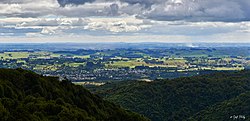Ashhurst
Ashhurst
Whārite (Māori) | |
|---|---|
 Ashhurst seen from Te Apiti Lookout | |
 | |
| Coordinates: 40°18′S 175°45′E / 40.300°S 175.750°E | |
| Country | New Zealand |
| Region | Manawatū-Whanganui region |
| Territorial authority | Palmerston North City |
| Ward |
|
| Electorates | |
| Government | |
| • Territorial Authority | Palmerston North City Council |
| • Regional council | Horizons Regional Council |
| Area | |
• Total | 4.21 km2 (1.63 sq mi) |
| Population (June 2024)[2] | |
• Total | 3,440 |
| • Density | 820/km2 (2,100/sq mi) |
| Postcode | 4810 |
Ashhurst (Māori: Whārite) is a town and outlying suburb of Palmerston North, in the Manawatū-Whanganui region of New Zealand's North Island.
Location
[edit]Ashhurst is sited 14 kilometres northeast of the Palmerston North city centre. The town stands under the Ruahine Ranges, beneath Wharite Peak,[3] which is the most notable peak on the south end of the Ruahine Range, upon which is the television and radio transmitter.
Demographics
[edit]Ashhurst covers 4.21 km2 (1.63 sq mi)[1] and had an estimated population of 3,440 as of June 2024,[2] with a population density of 817 people per km2.
| Year | Pop. | ±% p.a. |
|---|---|---|
| 2006 | 2,433 | — |
| 2013 | 2,649 | +1.22% |
| 2018 | 2,934 | +2.06% |
| Source: [4] | ||
Ashhurst had a population of 2,934 at the 2018 New Zealand census, an increase of 285 people (10.8%) since the 2013 census, and an increase of 501 people (20.6%) since the 2006 census. There were 1,074 households, comprising 1,428 males and 1,506 females, giving a sex ratio of 0.95 males per female. The median age was 35.9 years (compared with 37.4 years nationally), with 726 people (24.7%) aged under 15 years, 492 (16.8%) aged 15 to 29, 1,320 (45.0%) aged 30 to 64, and 396 (13.5%) aged 65 or older.
Ethnicities were 89.0% European/Pākehā, 18.6% Māori, 3.1% Pacific peoples, 2.8% Asian, and 1.4% other ethnicities. People may identify with more than one ethnicity.
The percentage of people born overseas was 12.9, compared with 27.1% nationally.
Although some people chose not to answer the census's question about religious affiliation, 56.3% had no religion, 32.8% were Christian, 0.6% had Māori religious beliefs, 0.6% were Hindu, 0.1% were Buddhist and 1.4% had other religions.
Of those at least 15 years old, 384 (17.4%) people had a bachelor's or higher degree, and 438 (19.8%) people had no formal qualifications. The median income was $34,300, compared with $31,800 nationally. 297 people (13.5%) earned over $70,000 compared to 17.2% nationally. The employment status of those at least 15 was that 1,179 (53.4%) people were employed full-time, 294 (13.3%) were part-time, and 66 (3.0%) were unemployed.[4]
Transport
[edit]
Ashhurst's importance stems from its location at the western end of the Manawatū Gorge. As such, it was close to the easiest road and rail link between the east and west coasts of the southern North Island. However, the Gorge has been closed since April 2017 and the road link to the east coast from Ashhurst is now via Saddle Road.
There are four buses on weekdays and one on Saturdays linking Palmerston North with Ashhurst.[5]
Parks and reserves
[edit]
- Ashhurst Domain – A large multipurpose park which includes a camping ground, a lookout to the wind farm, a cemetery and canine area.
- Durham Street Reserve and McCraes Bush Reserve[6][7][8]
- Lincoln Park – The home ground to the local rugby team Ashhurst-Pohangina RFC
History
[edit]Ashhurst was named for Lord Henry Ashhurst, who owned land in the immediate area. The Māori name for the area is Raukawa, after the native aromatic plant Pseudopanax edgerleyi, whereas for the town it is Otangaki.[9]
Local and central government representation
[edit]Former Ashhurst-Fitzherbert Ward
[edit]Ashhurst-Fitzherbert Ward was Palmerston North's largest ward covering the area from James Line to part way through the Manawatū Gorge, to just north of Ashhurst township. Wards were abolished in Palmerston North in 2013.
Central government
[edit]- Rangitīkei is represented by New Zealand National Party MP Ian McKelvie.
- Te Tai Hauāuru is represented by New Zealand Labour Party MP Adrian Rurawhe.
Education
[edit]Ashhurst School is a co-educational state primary school for Year 1 to 8 students,[10][11] with a roll of 493 as of November 2024.[12]
Notable people
[edit]- Andre Taylor, rugby player
- Mark McGrath, darts player
References
[edit]- ^ a b "ArcGIS Web Application". statsnz.maps.arcgis.com. Retrieved 29 April 2024.
- ^ a b "Aotearoa Data Explorer". Statistics New Zealand. Retrieved 26 October 2024.
- ^ Harriss, Gavin (August 2022). Ashhurst, Manawatu-Wanganui (Map). NZ Topo Map.
- ^ a b "Statistical area 1 dataset for 2018 Census". Statistics New Zealand. March 2020. Ashhurst (232200). 2018 Census place summary: Ashhurst
- ^ "Ashhurst Trial" (PDF). Horizons Regional Council. 3 April 2017.
- ^ Ashhurst: Durham Street Reserve – McCraes Bush "Palmerston North - Ashhurst: Durham Street Reserve - McCraes Bush". Archived from the original on 14 January 2015. Retrieved 17 March 2014.
- ^ "ashhurst dot org :: Parks". Retrieved 27 March 2017.
- ^ "McCrae's Bush – Wikimapia". Retrieved 27 March 2017.
- ^ Reed, A. W. (2002). The Reed Dictionary of New Zealand Place Names. Auckland: Reed Books. ISBN 0-7900-0761-4.
- ^ "Ashhurst School Official School Website". ashhurst.school.nz.
- ^ "Ashhurst School Ministry of Education School Profile". educationcounts.govt.nz. Ministry of Education.
- ^ "Ashhurst School Education Review Office Report". ero.govt.nz. Education Review Office.
